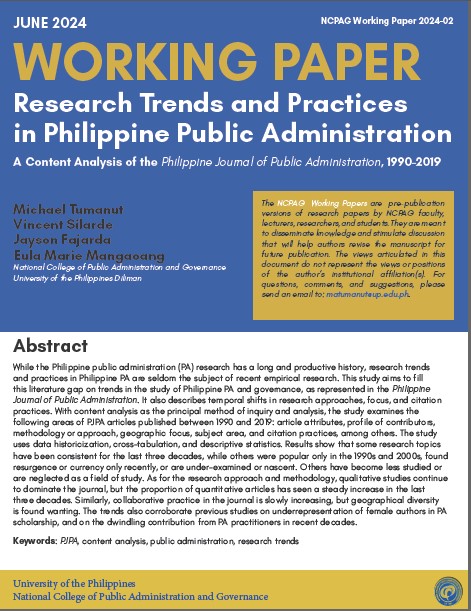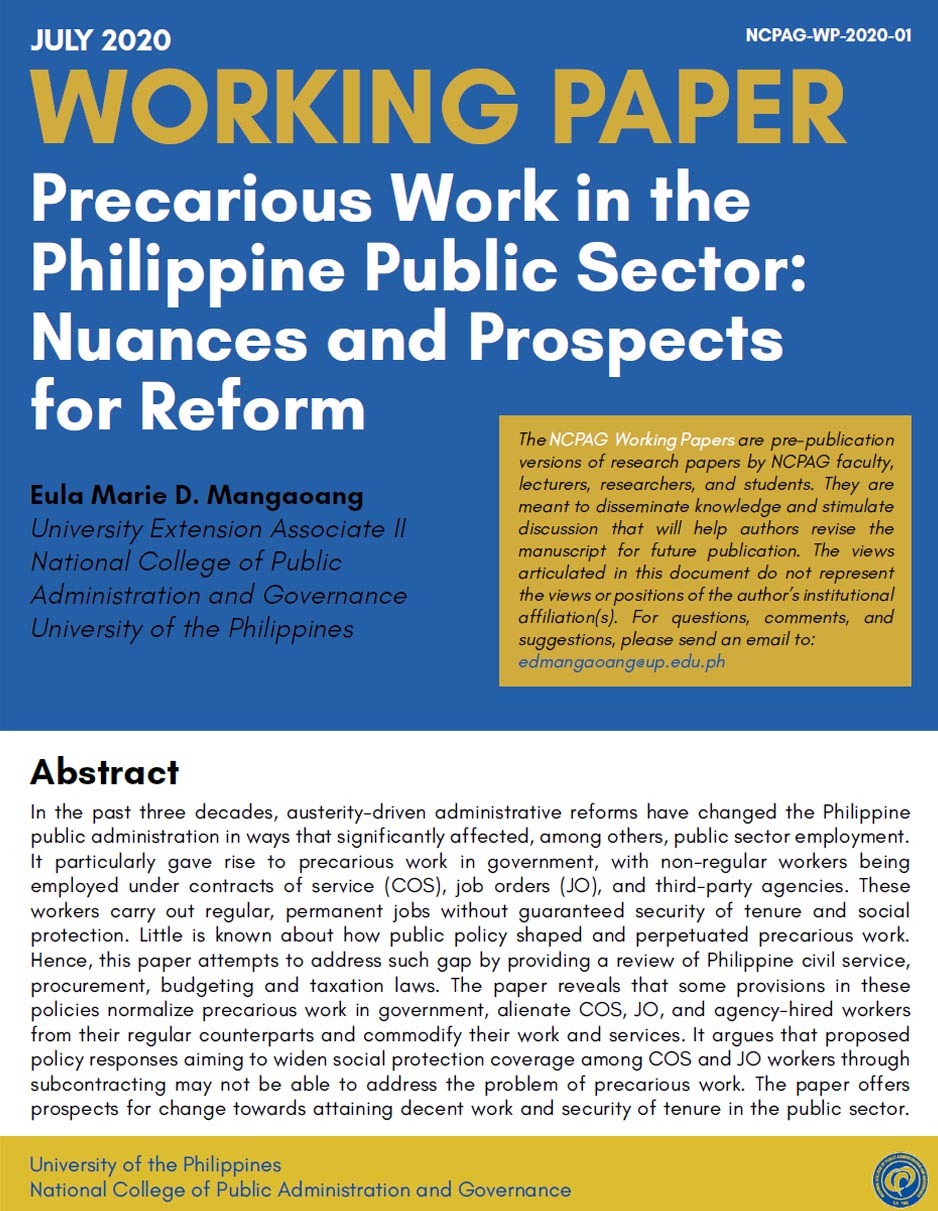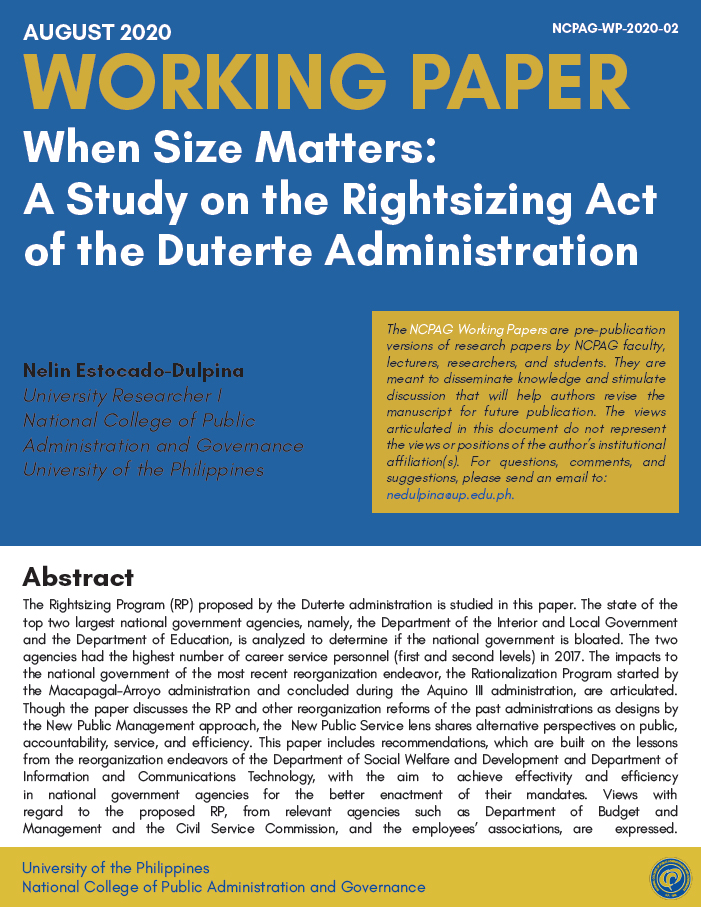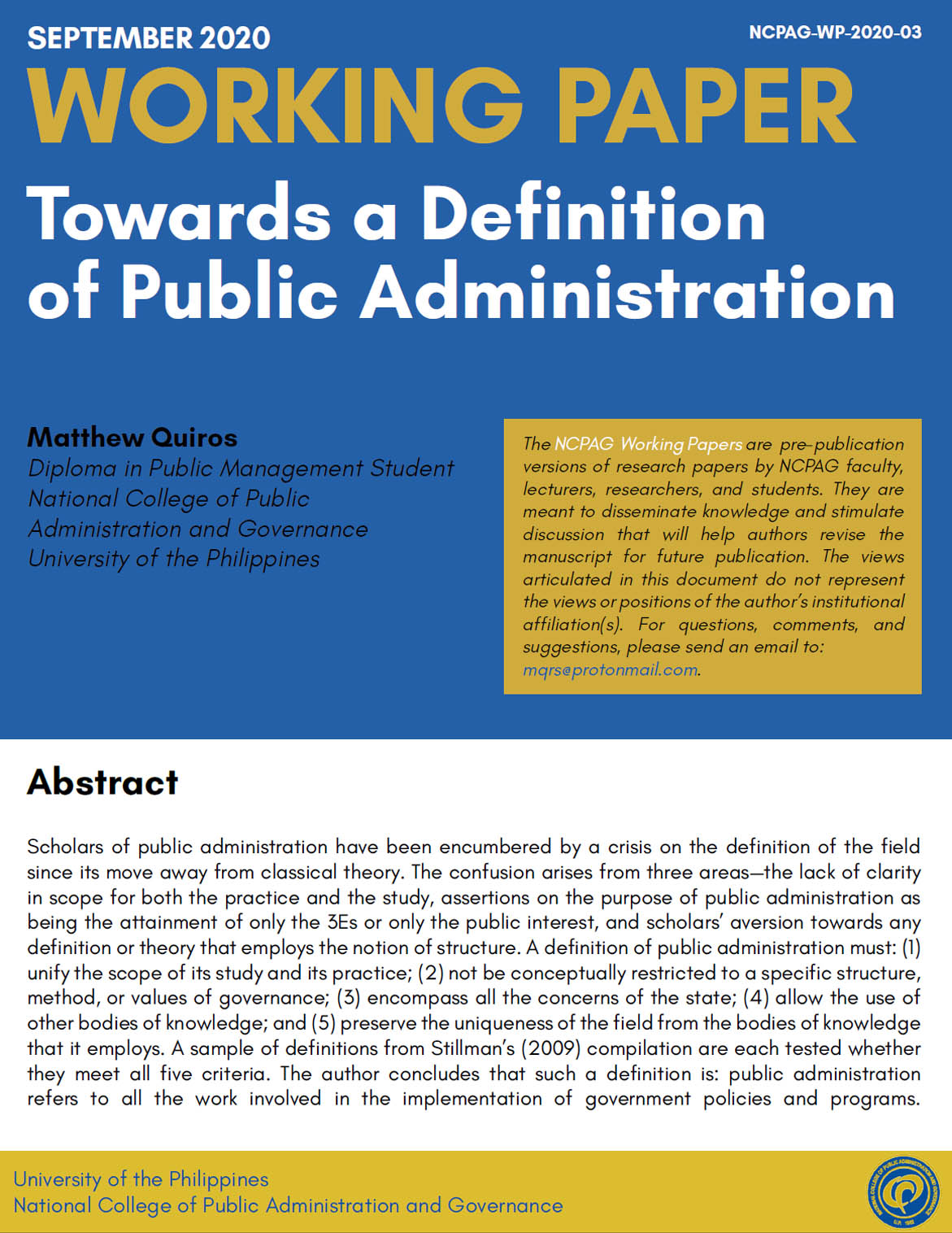NCPAG Working Papers
The NCPAG Working Papers are pre-publication versions of research papers by NCPAG faculty, lecturers, researchers, and students. They are meant to disseminate knowledge and stimulate discussion that will help authors revise the manuscript for future publication.


LATEST
NCPAG Working Paper 2024-02
Research Trends and Practices in Philippine Public Administration: A Content Analysis of the Philippine Journal of Public Administration, 1990-2019
Michael Tumanut, Vincent Silarde, Jayson Fajarda, Eula Marie Mangaoang
Abstract
While the Philippine public administration (PA) research has a long and productive history, research trends and practices in Philippine PA are seldom the subject of recent empirical research. This study aims to fill this literature gap on trends in the study of Philippine PA and governance, as represented in the Philippine Journal of Public Administration. It also describes temporal shifts in research approaches, focus, and citation practices. With content analysis as the principal method of inquiry and analysis, the study examines the following areas of PJPA articles published between 1990 and 2019: article attributes, profile of contributors, methodology or approach, geographic focus, subject area, and citation practices, among others. The study uses data historicization, cross-tabulation, and descriptive statistics. Results show that some research topics have been consistent for the last three decades, while others were popular only in the 1990s and 2000s, found resurgence or currency only recently, or are under-examined or nascent. Others have become less studied or are neglected as a field of study. As for the research approach and methodology, qualitative studies continue to dominate the journal, but the proportion of quantitative articles has seen a steady increase in the last three decades. Similarly, collaborative practice in the journal is slowly increasing, but geographical diversity is found wanting. The trends also corroborate previous studies on underrepresentation of female authors in PA scholarship, and on the dwindling contribution from PA practitioners in recent decades.
Read the paper here.
PAST PAPERS
NCPAG Working Paper 2020-01
Precarious Work in the Philippine Public Sector: Nuances and Prospects for Reform
Eula Marie D. Mangaoang
Abstract
In the past three decades, austerity-driven administrative reforms have changed the Philippine public administration in ways that significantly affected, among others, public sector employment. It particularly gave rise to precarious work in government, with non-regular workers being employed under contracts of service (COS), job orders (JO), and third-party agencies. These workers carry out regular, permanent jobs without guaranteed security of tenure and social protection. Little is known about how public policy shaped and perpetuated precarious work. Hence, this paper attempts to address such gap by providing a review of Philippine civil service, procurement, budgeting and taxation laws. The paper reveals that some provisions in these policies normalize precarious work in government, alienate COS, JO, and agency-hired workers from their regular counterparts and commodify their work and services. It argues that proposed policy responses aiming to widen social protection coverage among COS and JO workers through subcontracting may not be able to address the problem of precarious work. The paper offers prospects for change towards attaining decent work and security of tenure in the public sector.
Note: This working paper has been revised and published as a journal article in the Philippine Journal of Public Administration.


NCPAG Working Paper 2020-02
When Size Matters: A Study on the Rightsizing Act of the Duterte Administration
Nelin E. Dulpina
Abstract
The Rightsizing Program (RP) proposed by the Duterte administration is studied in this paper. The state of the top two largest national government agencies, namely, the Department of the Interior and Local Government and the Department of Education, is analyzed to determine if the national government is bloated. The two agencies had the highest number of career service personnel (first and second levels) in 2017. The impacts to the national government of the most recent reorganization endeavor, the Rationalization Program started by the Macapagal-Arroyo administration and concluded during the Aquino III administration, are articulated. Though the paper discusses the RP and other reorganization reforms of the past administrations as designs by the New Public Management approach, the New Public Service lens shares alternative perspectives on public, accountability, service, and efficiency. This paper includes recommendations, which are built on the lessons from the reorganization endeavors of the Department of Social Welfare and Development and Department of Information and Communications Technology, with the aim to achieve effectivity and efficiency in national government agencies for the better enactment of their mandates. Views with regard to the proposed RP, from relevant agencies such as Department of Budget and Management and the Civil Service Commission, and the employees’ associations, are expressed.
Read the paper here.
NCPAG Working Paper 2020-03
Towards A Definition of Public Administration
Matthew Quiros
Abstract
Scholars of public administration have been encumbered by a crisis on the definition of the field since its move away from classical theory. The confusion arises from three areas—the lack of clarity in scope for both the practice and the study, assertions on the purpose of public administration as being the attainment of only the 3Es or only the public interest, and scholars’ aversion towards any definition or theory that employs the notion of structure. A definition of public administration must: (1) unify the scope of its study and its practice; (2) not be conceptually restricted to a specific structure, method, or values of governance; (3) encompass all the concerns of the state; (4) allow the use of other bodies of knowledge; and (5) preserve the uniqueness of the field from the bodies of knowledge that it employs. A sample of definitions from Stillman’s (2009) compilation are each tested whether they meet all five criteria. The author concludes that such a definition is: public administration refers to all the work involved in the implementation of government policies and programs.
Read the paper here.
NCPAG Working Paper 2020-04
Phronetic Leadership and Organizational Knowledge Creation:
The Case of Rodolfo Del Rosario and Samal Cityhood
Lizan Perante-Calina, Michael A. Tumanut, and Alex B. Brillantes, Jr.
Abstract
Phronetic or wise leaders inspire and transform communities. They lead knowledge-based organizations where knowledge co-creation is promoted. Due to scant documentation in the Philippines of this leadership type, this paper aims to demonstrate a case of one provincial leader in instigating comprehensive reform in one island in Davao del Norte. This disciplined configurative case study is framed and explained by the four-part process of socialization-externalization-combination-internalization or SECI model of organizational knowledge creation. For reform and knowledge co-creation to occur in the island of Samal, the presence of a phronetic leader, Rodolfo del Rosario, was imperative. Del Rosario had demonstrated how his long-term vision, creation of ba, communication and political will (particularly persuasion and conflict management), and ability to inspire local leaders have all contributed to the successful merger of three municipalities in Samal Island to create the Island Garden City of Samal. After several decades of attempt, the conversion of the island into a higher status, in this case a city, eventually triggered a wave of organizational, management, infrastructural, and policy reforms in the area. The city now is in a better financial position and has exhibited good governance practices.
Read the paper here.
NCPAG Working Paper 2020-05
Philippines’ Sweat Equity in a History of Freedom Rationalized
Jillian Jocelyn B. Somera
Abstract
World War II ended 75 years ago in the Philippines. The yearly homage hosted by Kiangan, Ifugao Province honors this global historical landmark with the network and resources of the local government. Prospects to nationally observe the event with more engaged stakeholders and resources inspired this research. Primary data gathered during the 2016 commemoration shows a number of attendees providing stakeholder demographics with appreciation for history, turning the national and military shrine as a living memorial. These data guided policy recommendations to honor a Philippine contribution to the history of human emancipation. These findings were revisited through the lens of the locals during the 2019 celebration.
Read the paper here.
NCPAG Working Paper 2021-01
Better Leaders, Better Schools? Public School Heads’ Leadership Styles
and School Climate in Quezon City*
Pauline Marie Villar
Abstract
Quality public education requires quality school heads. This study aims to determine the correlation between the leadership style of a school head and school climate in the context of public elementary schools in Quezon City, a highly urbanized city in Metropolitan Manila, Philippines. The study included 36 individuals—one school head and two school teachers from each of the 12 randomly selected schools. The data was analyzed using ordinary least squares statistical test. Out of the nine indicators of the three leadership styles and three school climate indicators, only the relationships between intellectual stimulation and two aspects of school climate—physical resources and security—yielded statistically significant results. The findings also show that school heads and teachers perceived social support as the most-provided aspect of school climate, and physical resources as the least-supported. A key policy recommendation of the study is to design training programs with special focus on critical skills involved in school-based management for public school heads to more effectively address the needs of the school community.
Read the paper.
NCPAG Working Paper 2021-02
Is the Philippine Government COVID-19 Response Gender-Blind?
Michelle C. Castillo
Abstract
The COVID-19 pandemic is exacerbating the already dire state of inequality around the world, particularly for women. While the Philippines is considered as one of the most gender equal countries in the world, Filipino women still experience very high discrimination in different institutions, including the family, and with regard to physical integrity, access to productive and financial resources, and civil liberties. This preliminary descriptive study investigates whether the negative impacts of the pandemic on women were considered and factored in the Philippine COVID-19 response. It finds that the government’s pandemic response, both at the national and local levels, is not entirely gender-blind. Measures were taken to address sexual and gender-based violence. However, the government’s pandemic response glosses over other critical gendered impacts of the health crisis in terms of economic security, unpaid domestic and care work, sexual and reproductive health services, and empowerment of women.
Read the paper here.
NCPAG Working Paper 2021-03
Environmental Governance in the Philippines: A Pathway to Sustainable Development through the Effective Management of Natural Assets
Sonia Chand Sandhu
Abstract
This paper discusses the pivotal role of environment governance and the management of natural resources in a country’s sustainable development trajectory. It exemplifies alternative management approaches applied to water resources as a primary natural asset and suggests alternate strategies for addressing the complexities around environment governance. The evolution of environment governance in the Philippines is described together with its ranking on environment performance and the strategy being adopted in the current Philippine Development Plan 2017-2022 to mainstream ecological integrity in the socioeconomic agenda to ensure quality of life for all Filipinos. The state and governance of the country’s water resources is described and analyzed through the policy, public administration system and regulatory framework that directs water delivery to citizens. Total asset management approach is recommended as an innovative governance mechanism to enable the administration towards achieving water security. Given the intersectoral dimensions of environment governance, this paper further shares insights and illustrates collaborative and competitive governance approaches as alternative strategies that can help integrate environment governance within national and subnational strategies. Further the paper highlights the importance of assessing and evaluating policy effectiveness and measure of environment performance as a means for improving environment governance for a stronger path towards sustainable development.
Read the paper here.
NCPAG Working Paper 2021-04
COVID-19 and the Limits of Economic Growth Models: Case of the Philippines
Tomasito S. Villarin
Abstract
Authoritarianism and neoliberalism in the time of the COVID-19 pandemic exposed the limits of development theory anchored on economic growth models in a globalized market of unbridled liberalization and privatization. The virus immobilized people and economies already beset by a global trade war and the rise of autocrats. The pandemic, however, has a disproportionate impact on people and countries, exacerbating inequality and poverty within and among countries. Philippine President Rodrigo Duterte rode on the wave of economic growth in a regime of low inflation with the country enjoying the so-called “strong macroeconomic fundamentals.” COVID-19, however, radically changed the global landscape and unraveled market failures. For the first time in decades, the economy shrank to its lowest and is now in recession. The country imposed the longest and strictest lockdowns while grappling to contain the coronavirus. In the midst of a crisis, Duterte ramps up repressive measures but was stingy on stimulus spending. Government’s response to address the pandemic in political, fiscal, monetary and human development measures would be looked into in this paper.
Read the paper here.
NCPAG Working Paper 2022-01
Learning while Flattening the Epidemic Curve: A Policy Paper on the Resumption of Philippine Education amid COVID-19 Pandemic
Carlos Miguel S. Oñate, Jewel Mareai Arnejo, Keenu Louise Lopez, and Aidan Jeo De Guzman
Abstract
In the face of the COVID-19 pandemic, the Philippine government implemented distance learning through the Department of Education’s blended learning and the Commission on Higher Education’s flexible learning policies for the resumption of basic and higher education classes in the Philippines for the academic year 2020-2021. However, these policies were criticized as “anti-poor,” with some sectors calling for an academic freeze instead. This policy paper examines these policies alongside its policy system through a stakeholder analysis. It then takes a look at whether the government’s policies are the appropriate response to such policy concern. Three key alternative policy options are also evaluated. Based on the policy analysis, several recommendations are formulated with the end view of ensuring that education would not be neglected in the new normal. Among the recommendations is the implementation of a short-term academic freeze preceding the resumption of distance learning classes to provide ample time for capacity building.
Read the paper here.
NCPAG Working Paper 2022-02
When Behavioral Science Meets Public Administration: An Exploration of Behavioral Approach in Public Administration Research
Paul Nyray A. Antolino and Ma. Regina M. Salonga
Abstract
The importance of behavioral science in public administration (PA) has been a topic of interest since the infancy of the discipline. It has been advocated by some well-known PA scholars since then. Despite this recognition, there is a failure of connecting the two disciplines. Even in the Philippines, there is a paucity of research studies of using a behavioral approach in public administration research. To fill this gap, this study explores the behavioral approach in the leading journal of public administration in the country, the Philippine Journal of Public Administration (PJPA), using content analysis. The results revealed that behavioral science is manifested in PJPA articles with varying degrees of application. Behavioral approach is employed in the different subfields of public administration. However, the trend of use is fluctuating over the years. Further, the Philippines is lagging behind its neighboring countries such as Singapore, Japan, Thailand, and other countries in terms of integrating this approach in PA research. This study recommends further incorporation of behavioral science in the subfields of public administration, as well as for further use of this approach in solving social issues.
Read the paper here.
NCPAG Working Paper 2023-01
Incorporating Insights from Behavioral Science into Public Administration: Changing Mindsets and Behaviors in the Public Sector Setting
Paul Nyray A. Antolino
Abstract
Public administration (PA) is a multidisciplinary field. One important discipline linked to PA is behavioral science. Although there has been a call for the integration of PA and behavioral science, scholars also recognized the failure of this integration. To contribute to the growing trend of research, the current study investigated how mindsets and behaviors in the public sector towards corruption may be changed using behavioral science. With this, the author created a model derived from social cognitive theory, kapwa theory, nudge theory, and flexible mindset. This will help individuals learn ethical behaviors and mindsets. The model also reinforces the mindsets, values, behaviors, and other dimensions indicated in the Governance Reform Framework. In doing so, the model hopes to contribute to good governance; strengthen the principles of effectiveness, inclusiveness, and accountability; and help achieve global and national development goals.
Read the paper here.
NCPAG Working Paper 2023-02
Tulong Pangkabuhayan sa Pag-unlad ng Samahang OFW (Tulong PUSO) - A Livelihood-Oriented Reintegration Program for OFWs: Awareness, Challenges, and Current Impact
Jay Lord Alden L. Estolas
Abstract
The increase in the number of returning overseas Filipino workers (OFWs) can be attributed to several factors. Returning to their home country presents challenges for these individuals, particularly concerning financial stability. The government has taken steps to provide support and assistance to OFWs, focusing on training and proper reintegration into society. The Philippine reintegration program offers intervention services that aid returnees and their families through reemployment opportunities or the facilitation of livelihood development. The primary objective of these reintegration programs is to optimize the benefits of overseas employment and foster a productive transition back to the community. This paper delves into the awareness level of OFWs regarding the Tulong Pangkabuhayan sa Pag-unlad ng Samahang OFWs or Tulong PUSO, a livelihood-oriented reintegration program initiated by the Philippine government for this specific sector. The study also examines the challenges faced during the implementation of the program and its initial impact.
Read the paper here.
NCPAG Working Paper 2024-01
Performance Measurement on Local Tourism and Cultural Governance
Sherwyn Renzo G. Ramirez
Abstract
Measuring performance is an essential topic within the discipline of public administration. In the Philippines, at the local government level, it is being implemented mainly using the Seal of Good Local Governance (SGLG) indicators. It aims to recognize local government authorities whose governance practices are admirable. The evaluation is predicated on a set of criteria, including tourism and culture as governance areas. This study defined tourism and cultural governance according to academic literature. The present assessment criteria for these distinct areas of governance were analyzed using a framework developed for this paper based on the literature on performance measurement. This paper also attempts to suggest a customized index based on the Balanced Scorecard (Kaplan & Norton, 1992). The research concludes that the current performance measurement is incomplete and needs to be improved.
Read the paper here.
